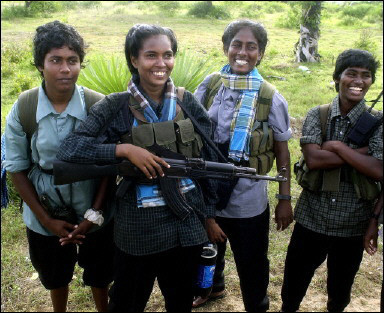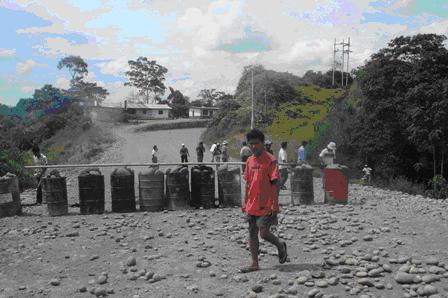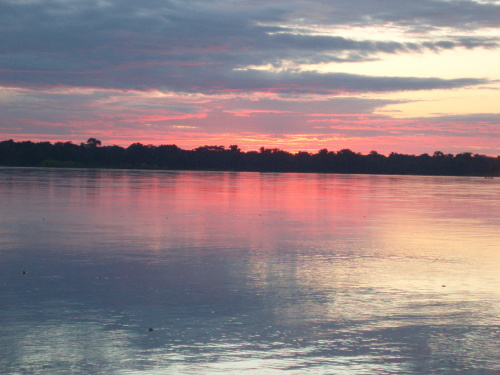Anti-militarism
Killings in the Amazon: Peruvian protests even more violently repressed
colonos is reproducing here a text by Ben Powless on rabble.ca, including the “INTERNATIONAL DENUCIATION of President Alan García Pérez of Peru and his admistration” by the COORDINATING BODY OF ANDEAN INDIGENOUS ORGANZIACIONES – CAOI.
We have received various notices from people in the Amazon reporting about 10 – 40 indigenous protesters having been shot dead.

Here goes:
50 days of protest and one massacre in the Peruvian Amazon
I’m writing this right now from Peru after having taken part in a 5 day Indigenous Peoples Summit held in Puno, Peru in the high Andes. Read the rest of this entry »
Female Freedom Fighter or Suburban, Affluent Mother?
A recent article, which I first read on a mailing list without knowing its source, starts very promising, is very informative, at times sad, and in many ways, to me, reads as a good introduction to why people become freedom fighters. In the end, however, unsurprisingly given the publisher of the article, the article turns into an advocacy for a middle-class, affluent, surburban existence in a foreign, stable country, “with firm, positive views, but without the blind idealism“, in other words, against the ideals of youth that lead people to take affirmative action to change the world. All youthfulness written off as “blind idealism” with suburbia as the only alternative?
The article is about the Tamil Tigers, which began as a movement against the genocide that the Sinhalese controlled state of Sri Lanka is committing on the Tamil minority. They were freedom fighters that the state – and now the international community – condemn as terrorists. Perhaps they have become terroristic rather than freedom fighting, but being the underdog, the minority and the victims of genocide, who have not been heard, it is difficult to see how the Tamil people in Sri Lanka could escape their lose-lose scenario.
Just roll over and die as a people and as a culture? Die fighting? Or perhaps keep fighting in the hope that you can gain the rights and recognition required to live in “peace”?
Is an existence as a suburban, affluent mother more worthy, a better morally choice, than being a freedom fighter for your people? Direct, intentional violence – or indirect, ignorant violence? Shop or fight? Is that really all there is to it?
Obama: A Mad Men Creation of Lies, Wars and Torture for Profit
When the Obamamania swept the public imagination of TV watching, non-critical minds and those so desperate for change that anything? seemed believable, the colonos blog, as so many others outside of the corporate conspiracy practices, pointed out that – if any change at all – Obama was for the worse. More intimately linked to zionist extremists, particularly through Rahm Emanuel, deeper in bed with corporate banks, particularly the zionist Goldman Sachs, and the elite intelligentsia, such as the racist, misogynist Larry Summers, who no longer need to be embarrassed about their president’s IQ, Obama is quite possibly the worst thing that has ever happened in political terms to the Planet Earth.
Uncle Tom the Warmonger in the White House of Profit. Calling him black is in itself a form of (warped) racism. Born by a white woman, raised by a white woman, taught by white men, elected by white people, he walks the walk and talks the talk of the White Man. What makes him black? The genetic input of an absent father? His “tainted” skin colour? White is as white does.
What is the point of repeating these so god damn obvious aspects of the elite’s new face of control? Well, they merely serve as an introduction to a recent summary of Obama, the Mad Men business as usual leader, by journalist John Pilger, which I shall leave you with:
Obama’s First 100 Days:
The Madmen Did Well
John Pilger, On April 28, 2009 @ 9:00 pm
The American soap Madmen offers a rare glimpse of the power of corporate advertising. The promotion of smoking half a century ago by the “smart” people of Madison Avenue, who knew the truth, led to countless deaths. Advertising and its twin, public relations, became a way of deceiving on a scale imagined by those who had read Freud and applied mass psychology to anything from cigarettes to politics. Just as the Marlboro Man was virility itself, so politicians could be branded, packaged, and sold.
It is 100 days since Barack Obama was elected president of the United States. The “Obama brand” has since been named Advertising Age’s “marketer of the year for 2008,” easily beating Apple. David Fenton of MoveOn.org describes Obama’s election campaign “an institutionalized, mass-level, automated technological community organizing that has never existed before and is a very, very powerful force.” Deploying the Internet and a slogan plagiarized from the Latino union organizer Caesar Chavez – Si se puede! – “yes, we can,” the “mass-level, automated technological community” marketed its brand to victory in a country desperate to be rid of George W. Bush.
No one knew what the new brand actually stood for. So accomplished was the advertising – a record $75 million was spent on TV commercials alone – that many Americans actually believed Obama shared their opposition to Bush’s wars. In fact, he had repeatedly backed Bush’s warmongering and its congressional funding. Many Americans also believed he was the heir to Martin Luther King’s legacy of anti-colonialism. Yet if Obama had a theme at all, apart from the vacuous “change you can believe in,” it was the renewal of America as a dominant, avaricious bully. “We will be the most powerful!” he declared.
Mapping Indigenous Mexico for whom?
US Academics Are Mapping Resources in Mexico; Corporations and the US Military Are the Beneficiaries of the Data
By Silvia Ribeiro
La Jornada February 3, 2009
colonos are reproducing here an investigation by the ETC Group, also posted on NarcoNews
As the Union of Organization of the Sierra Juarez [Unión de Organización de la Sierra Juárez de Oaxaca] has complained (Unosjo, 15/1/09), they have been victimized by a new type of appropriations in their communities: “geo-piracy”. This refers to using (and abusing) the local wisdom of the indigenous and rural villages to make digital highly detailed maps of their geography, resources, (hydrology, natural and cultivated biodiversity, archeology, social, cultural) to place all this on electronic pages with open access, at the disposition of whoever wants to use it. For example, corporations, institutions, or the army of the United States, which financed the project in Oaxaca. What is true, is that previously the project was carried out in nine communities of the Potosi Huasteca, and it is going on in the Sierra Tarahumara.
The implications of this type of activity are so vast, that it is difficult to sum them up. The detailed and precise map of the territories is only possible if it is extracted from local knowledge of those who live there. On processing this knowledge with new technologies, such as systems of digital geographic information, superimposed on satellite maps freely accessible on Google, one obtains an enormous volume of information which is not known or can not be appraised. These maps are of great utility for military ends and for counterinsurgency, but also for industrial purposes (exploitation of resources like minerals, plants, animals and biodiversity; mapping access roads already constructed or “necessary”, sources of water, settlements, social maps of possible resistance or acceptance of projects, etcetera). Read the rest of this entry »
Mining Action Alert
Action Alert: Ask the Ecuadorian Government to Protect Human Rights During Upcoming Anti-Mining Demonstrations
The Ecuador Solidarity Network, an organization based in Canada and the United States, is joining human rights and indigenous peoples organizations in calling on President Rafael Correa to respect human rights during nation wide protests against large-scale mining that will begin on Monday January 19th.
The protests will spread from the Amazon and reach Quito, Ecuador’s capital, on January 20th. Anti-mining protests earlier this month were met with police violence in the Southern provinces of Azuay, Loja, Zamora Chinchipe and Morona Santiago. A number of activists were beaten and detained, and one leader was critically injured after being shot in the head.
The Confederation of Indigenous Nationalities of Ecuador (CONAIE) and a number of farmer and environmental organizations are protesting against the recent approval of a mining law by Congress, opening the country to large-scale metal mining. Canadian mining companies would benefit from many of the concessions. The CONAIE and other organizations contend that the new law will allow large-scale mining in protected areas and contaminate critical community water supplies. The CONAIE is also protesting against government plans to drill for oil in the Yasuni National Park, the rainforest home of two indigenous communities in voluntary isolation.
Following recent statements from the Permanent Assembly for Human Rights (APDH) and the Confederation of Indigenous Nationalities of Ecuador (CONAIE), the Ecuador Solidarity Network calls on activists around the world to support the human rights of protesters demonstrating against large-scale metal mining in Ecuador. The CONAIE emphasizes that the demonstrations will be peaceful and calls on President Correa to not use police or military forces against protesters.
E-mail President Rafael Correa and President of Congress Fernando Cordero and ask that the government take preventative action to ensure that protesters’ human rights are respected. We also denounce any attempt by right-wing organizations in the U.S. or Canada to opportunistically use the upcoming mobilizations to attack President Correa for motives that have nothing to do with indigenous rights or environmental protection.
Please send emails to:
Presidencia de la República, Presidente Rafael Correa:
presidencia @ presidencia . gov . ec
Presidencia Legislativa, Presidente de la Comision Legislativa y de Fiscalizacion, Fernando Cordero Cueva:
presidencia @ asambleaconstituyente . gov . ec
Please send a carbon copy of the messages to
ecuadorsolidarity @ gmail . com
Media Contacts:
Ecuador: Jennifer Moore, Ecuador Solidarity Network (593) 8-877-8928 / jenmoore0901 @ gmail . com
Canada: Jamie Kneen, Mining Watch (613) 761-2273
UNASURrender to global capitalism
Rafael Correa is the poster boy of neo-socialism – he wears Quechua shirts and bathes himself in the limelight of indigeous peoples’ struggle in the global media, makes promises to the poor and the illiterate (and also delivers on some of his promises) – but more than anything he is increasingly despised by the indigenous peoples and the campesinos “who mean nothing to him” and who he represses violently if they organise against the foreign companies that Correa contracts their land away to. Also known in international socialist and even environmental circles as the saviour of the Yasuni national park. But nothing could be further from the truth – as has been reported by the colonos blog since before Correa entered office.
I have just returned from a meeting where yachaks (shamans) from various regions of “el Oriente” (basically the Ecuadorian Amazon) have gathered all weekend to discuss, among other things, Correa’s rejection in the constituent assembly processes of collective rights and a range of specific demands made by the indigenous movements as part of the rewriting of the Ecuadorian constitution. Talks are of strikes and some suggest that another uprising is brewing – at any rate Rafael Correa is very unpopular with indigenous people and campesinos, because he arrogantly have stated that he cares not about their demands since “they only constitute a few percent of his voters“.
So what does Mr. Correa care about – well, like the Clintons he seems mostly fascinated by inscribing himself into the white man’s history of conquest of the world through an industrial economy that is essentially based on exploitation of labour and pachamama (mother earth).
“Unasur to boost financial self-sufficiency in S America:
BRASILIA, May 23 (Xinhua) — Ecuadorian President Rafael Correa said here Friday that the Union of South American Nations (Unasur) will boost programs to help realize financial self-sufficiency in the region.
After signing the bloc’s constitutive agreement in the Brazilian capital, Correa said it was “a historical day for South America, which brings great expectation and hope.”
“We can do like the European Union (EU). As the EU has to explain why they united, we will have to explain to our children and grandchildren why we took so long to do it,” he told a press conference.”“
Correa’s vision and that of UNASUR is about entrance into an economy that many ever since its inception – with the conquest of new worlds and the industrial production apparatus that makes wars for more profit possible – have been fighting. And for quite some years it has been quite clear that it is a very unsustainable economy that the planet cannot sustain.
Of course it is the rich and the powerful who mostly have to change their wasteful ways, but to happily join that horrible economy that Correa is so blinded by and which accelerates climate change and destroys civilization is plain stupid. However, the middle classes who get better roads (this, the year where it seems like we have to take drastic measure and actions to counter climate change, is the year of asphalt in Ecuador), nicer cars to drive them on and bigger supermarkets to park them by and shop in, and of course the capitalists that exploit the natural resources that he so happily gives to foreign and private interests are laughing all the way to the bank while the earth cries.
The rest of the chinese article follows.
Did U.S. Mercenaries Bomb the FARC Encampment in Ecuador?
This is an article that is well worth a read – no further comments at this stage, it’s just a little bit of history repeating:
Repression in Orellana
In the night of November 30 – December 1, over 50 people (including 3 minors), mainly from the community of Dayuma near Coca in the Northern Amazon region of Ecuador, were violently arrested by the military acting on orders of President Rafael Correa who pronounced a State of Emergency in the Amazonian Province of Orellana (Decree 770) due to protests in the oil producing province for improving road infrastructure and basic services and against feared quasi-privatisation of the state-owned oil company PETROECUADOR.

Communities criminalised for defending nature – summit in Quito
A grassroots summit.
On November 16, indigenous, mestizo and African-Ecuadorian community leaders, farmers, environmentalists, activists, and individuals affected or concerned about the environmental situation in Ecuador gathered at the Catholic University in Quito for the First Summit of Communities Criminalized for Defending Nature.
Over recent years, violent confrontations, repression and human rights violations have increasingly characterised environmental conflicts in all parts of the country. The summit was organised by a variety of social movements in order to publicly highlight political, juridical, and extra-judicial persecutions and abuses of social and environmental activists.
Testimonies of persons jailed, criminalised, shot and stories of those assassinated were shared and collected and the social, political and economic reasons and consequences of the persecutions analysed. The global nature of repression against movements opposed to environmentally and socially damaging projects was emphasised, and the summit declared solidarity and support for all social and environmental grassroots movements worldwide.
The summit participants later marched to hand members of the National Constitutional Assembly a petition for amnesty for the over 200 community leaders currently imprisoned for the execution of their right to protest and to live in a healthy environment. The petition also demanded an end to the ceaseless violations of human rights and community rights to ancestral land generated by mining, oil exploitation, logging, hydroelectrical power stations, and shrimp farming.
(Freely translated and abridged from Javier Mazeres’ article of the same title, published in the newsletter of the Catalonian Association Ali Supay – www.alisupay.org)
The Fascist Mask and the continuity of the State of Exception: Naomi (sheep in) Wolf (‘s clothes)
There is something happening, it seems, in the U.S. People are slowly becoming aware of the severe erosion that their “great democratic country” is suffering under.
A writer called Naomi Wolf is speaking to the well-educated, yet uninformed American. She speaks about the “pattern of fascism”, or the classic signs of an “open society” being transformed into a closed or totalitarian society of which fascism is one model that the world has seen in various permutations. The actions of Stalin, Goebbels and Bush et al. are compared to one another – with a view to get the latter impeached – and to establish that there is a “blue print” for closing down society – that is, transform what Wolf considers a “free, open democratic society” into a totalitarian regime. With the blue print in hand you can see how it happens again and again.




